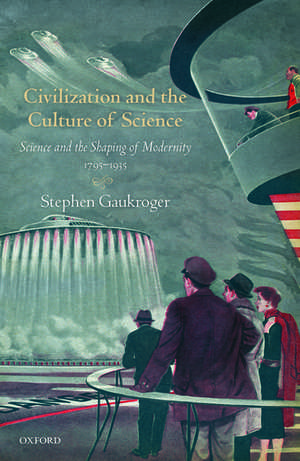Civilization and the Culture of Science: Science and the Shaping of Modernity, 1795-1935: Science and the Shaping of Modernity
Autor Stephen Gaukrogeren Limba Engleză Hardback – 3 mar 2020
| Toate formatele și edițiile | Preț | Express |
|---|---|---|
| Paperback (1) | 166.82 lei 10-16 zile | +44.16 lei 7-13 zile |
| OUP OXFORD – 31 mar 2022 | 166.82 lei 10-16 zile | +44.16 lei 7-13 zile |
| Hardback (1) | 376.77 lei 10-16 zile | |
| OUP OXFORD – 3 mar 2020 | 376.77 lei 10-16 zile |
Preț: 376.77 lei
Preț vechi: 480.17 lei
-22% Nou
Puncte Express: 565
Preț estimativ în valută:
72.10€ • 74.85$ • 60.12£
72.10€ • 74.85$ • 60.12£
Carte disponibilă
Livrare economică 18-24 februarie
Preluare comenzi: 021 569.72.76
Specificații
ISBN-13: 9780198849070
ISBN-10: 0198849079
Pagini: 535
Dimensiuni: 160 x 241 x 45 mm
Greutate: 0.82 kg
Editura: OUP OXFORD
Colecția OUP Oxford
Seria Science and the Shaping of Modernity
Locul publicării:Oxford, United Kingdom
ISBN-10: 0198849079
Pagini: 535
Dimensiuni: 160 x 241 x 45 mm
Greutate: 0.82 kg
Editura: OUP OXFORD
Colecția OUP Oxford
Seria Science and the Shaping of Modernity
Locul publicării:Oxford, United Kingdom
Recenzii
This is a remarkable work of scholarship and the fifty-page bibliography is a testament to the author's breadth of knowledge and reading, which forms the scientific basis for his outstanding contribution to the field.
Recommended. Lower-level undergraduates through faculty.
The question the author has set out to answer is, on the face of it, quite simple: How is it that science, utterly marginal in Europe's medieval culture, has become central to our modern culture? It is this very question that, for many a historian but also philosopher or sociologist of science, has stood in the background or even at the forefront of their decision to become one. Yet no one so far has had the courage, and the stamina, and the scholarly experience, and the vast erudition, and the organizing power, and the familiarity with a number of indispensable languages that Stephen Gaukroger displays and that are needed to engage the question on anything like the scale it deserves. . . . there are many reasons for profoundly admiring Gaukroger's achievement.
This is the much-awaited fourth volume of a series, Science and the Shaping of Modernity, that canvasses the history of science with a keen eye to the broader cultural context.... The erudition and dense attention to detail are breathtaking at times. I marvel to think that one scholar could command so much knowledge of the subject, both primary and secondary sources, and bring to bear such sophisticated philosophical judgment.
Recommended. Lower-level undergraduates through faculty.
The question the author has set out to answer is, on the face of it, quite simple: How is it that science, utterly marginal in Europe's medieval culture, has become central to our modern culture? It is this very question that, for many a historian but also philosopher or sociologist of science, has stood in the background or even at the forefront of their decision to become one. Yet no one so far has had the courage, and the stamina, and the scholarly experience, and the vast erudition, and the organizing power, and the familiarity with a number of indispensable languages that Stephen Gaukroger displays and that are needed to engage the question on anything like the scale it deserves. . . . there are many reasons for profoundly admiring Gaukroger's achievement.
This is the much-awaited fourth volume of a series, Science and the Shaping of Modernity, that canvasses the history of science with a keen eye to the broader cultural context.... The erudition and dense attention to detail are breathtaking at times. I marvel to think that one scholar could command so much knowledge of the subject, both primary and secondary sources, and bring to bear such sophisticated philosophical judgment.
Notă biografică
Stephen Gaukroger, who was educated at the University of London and the University of Cambridge, is Emeritus Professor of History of Philosophy and History of Science at the University of Sydney. He is author of fourteen books and the editor of nine collections of essays. His recent publications include The Emergence of a Scientific Culture: Science and the Shaping of Modernity, 1210-1685 (Oxford 2006), The Collapse of Mechanism and the Rise of Sensibility: Science and the Shaping of Modernity, 1680-1760 (Oxford 2010), and The Natural and the Human: Science and the Shaping of Modernity, 1739-1841 (Oxford 2016). His work has been translated into Arabic, Chinese, French, German, Italian, Portuguese, and Russian.




